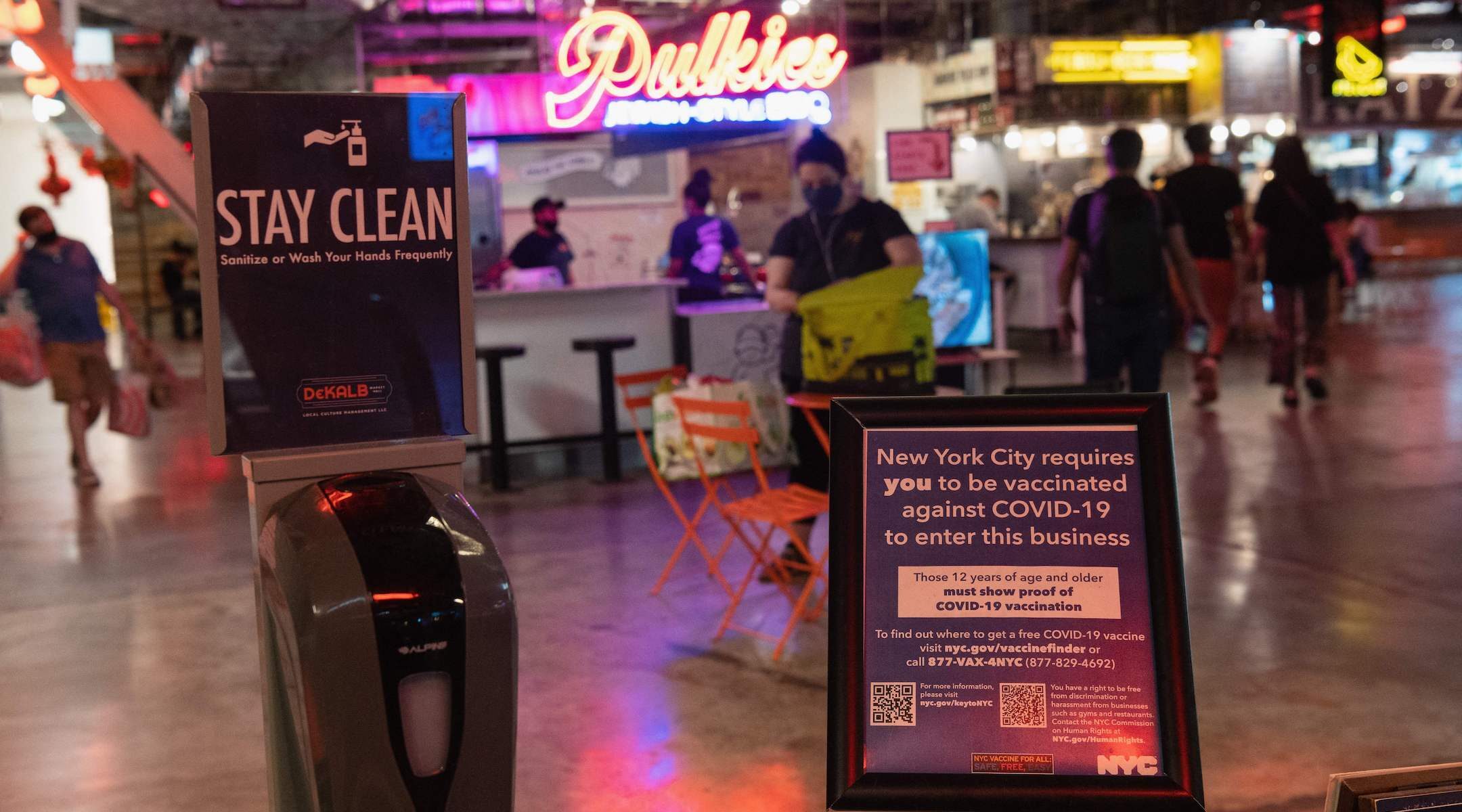(New York Jewish Week via JTA) – Five Orthodox Jewish New Yorkers have joined a suit challenging the city’s vaccine requirements for indoor spaces.
Two of the plaintiffs are rabbis at yeshivas. The suit, filed Feb. 7 in New York, challenges the “Key to NYC” program and a recent Covid vaccination mandate for religious and private school employees. The mandate was opposed by many haredi Orthodox yeshivas and groups representing them, including Agudath Israel of America.
Three of the Jewish plaintiffs are parents suing on behalf of a total of 12 of their children, all minors, whose COVID vaccination they oppose on what they claim are religious grounds.
The unnamed plaintiffs allege an “unprecedented abuse of power” in regard to COVID vaccine requirements for indoor spaces in the city. The plaintiffs, who also include a Catholic resident of New York, object to the vaccine on religious and constitutional grounds.
The Catholic and Orthodox Jewish plaintiffs say the vaccines are derived from research into fetal cell lines from abortions in the 1970s and ’80s, a technology they oppose on religious grounds. Another religious ground cited by the Orthodox Jewish plaintiffs is that “[s]ubmitting to a government dictate that conditions freedom on vaccination is a form of slavery and subjugation” that “violates numerous commandments in the Torah that require one to remember and internalize the great Exodus from slavery in ancient Egypt.”
Groups representing the major Jewish denominations, including the Orthodox Union and the Rabbinical Council of America, have all released statements endorsing vaccines, and many rabbis in the haredi Orthodox community have participated in campaigns to increase vaccination rates in their communities. Still, Orthodox health professionals and communal leaders note that a vocal minority of their community won’t heed their guidance.
The suit was filed by the Thomas More Society, a conservative Catholic nonprofit that earlier in the pandemic represented Orthodox Jews in New York in a lawsuit opposing caps on the number of attendees able to attend houses of worship. In that case, a judge blocked the state from imposing stricter rules on houses of worship than on other businesses.
In November 2020, in a case brought by Agudath Israel, the Supreme Court ruled that occupancy restrictions and mandates unfairly discriminated against religious institutions.
The Thomas More Society has filed a number of lawsuits across the country opposing vaccine requirements, including representing health care workers in New York State who have been denied an exemption from the vaccine on religious grounds.
If successful, the suit would allow yeshiva employees to remain or return to work without a vaccine, as well as gather indoors and gain access to the same spaces as vaccinated New Yorkers without discrimination.
Named in the suit are New York City Mayor Eric Adams and Dr. Dave Choski, the commissioner of the city’s Department of Health and Mental Hygiene.
The suit asserts that the Key to NYC program is creating a two-tiered society within the city, where unvaccinated residents are unable to participate in daily life or institutions, and that the program violates rights to due process, equal protection, privacy, freedom of assembly and free exercise of religion.
“Never in the history of this country, nor in the history of pandemics generally, has any government declared an entire class of citizens personae non gratae based on refusal to be vaccinated,” wrote Thomas More Society Special Counsel Christopher Ferrara in a press release. “What we see here is the sad corruption of public health policy by power politics.”
The complaint also alleges that Key to NYC offers exemptions to secular activities and discriminates against religious activities, and discriminates against those who hold that COVID-19 vaccinations violate their religion.
Marc Stern, the chief legal officer for the American Jewish Committee, does not see sufficient evidence for the religious freedom claim, and said several of the lawsuit’s other claims, including that the Key to NYC program infringes on a person’s right to privacy, are baseless.
“I can’t say the suit is completely frivolous, and there are certainly disturbing aspects to the accommodation guidelines, where some of the lines aren’t neat and clean,” Stern said. However, “the court has ruled many times that in cases of an epidemic, the government has great latitude for what they can do to balance public health guidelines with what will benefit the economy. I’m reasonably certain this case will not see a sympathetic response, and those lines will prevail.”
The New York Jewish Week brings you the stories behind the headlines, keeping you connected to Jewish life in New York. Help sustain the reporting you trust by donating today.





